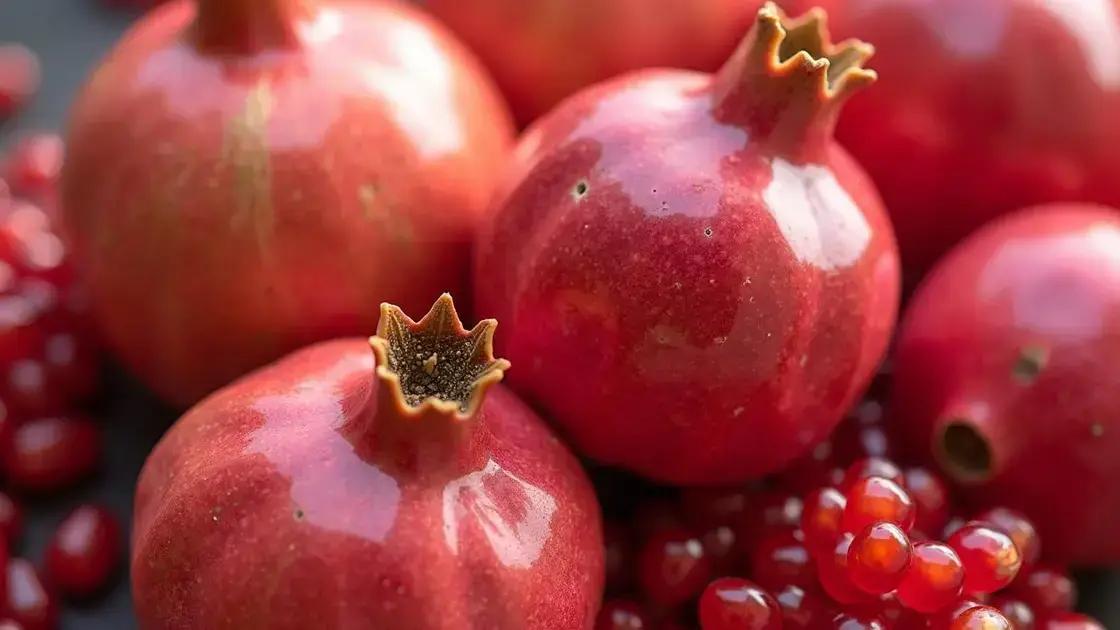Pomegranates boost nitric oxide levels in the body, offering benefits such as improved blood flow, lower blood pressure, and enhanced athletic performance. Incorporating pomegranates into your diet can be achieved through smoothies, salads, juices, and snacks, making it easy to enjoy their health advantages.
Pomegranate is a powerful fruit well-known for its numerous health benefits, including boosting nitric oxide levels. Nitric oxide plays a vital role in cardiovascular health, enhancing blood flow, and improving exercise performance. In this article, we will delve into the role of pomegranate in boosting nitric oxide levels, examine how it impacts our health, and explore other dietary options that can help maximize nitric oxide production.
What is Nitric Oxide and Why is it Important?

Nitric oxide (NO) is a gas that our bodies naturally produce. It is crucial for several important functions, especially in the cardiovascular system. Understanding nitric oxide can help us appreciate its significance in our health.
What is Nitric Oxide?
Nitric oxide is a molecule that helps blood vessels relax and widen. This process, called vasodilation, improves blood flow throughout the body. The body produces nitric oxide from the amino acid arginine and other sources.
Why is Nitric Oxide Important?
Nitric oxide plays a key role in maintaining good health. Its benefits include:
- Improving blood flow: Good circulation ensures that organs and muscles receive enough oxygen and nutrients.
- Lowering blood pressure: By relaxing blood vessels, nitric oxide can help reduce high blood pressure.
- Enhancing exercise performance: Increased blood flow helps muscles work better and recover faster during physical activity.
- Supporting immune function: Nitric oxide helps the body fight off infections and diseases.
As we age, the production of nitric oxide may decline, leading to various health issues. This emphasizes the importance of finding ways to boost its levels naturally.
How Pomegranates Affect Nitric Oxide Production

Pomegranates are more than just delicious fruits; they have properties that can significantly enhance the production of nitric oxide in the body. Discovering how pomegranates affect this important molecule can help us understand their impact on our overall health.
Components That Boost Nitric Oxide
Pomegranates contain polyphenols and flavonoids, two types of antioxidants that help improve nitric oxide production. These compounds help protect the cells that create nitric oxide and increase its availability in the bloodstream.
Enhancing Blood Vessel Function
When consumed, pomegranates support vascular health by improving blood flow. This happens because the antioxidants in pomegranate juice help the endothelial cells, which line blood vessels, produce more nitric oxide. As a result, blood vessels can relax and expand, promoting better circulation.
Scientific Studies
Research has shown that drinking pomegranate juice can increase nitric oxide levels. Some studies indicate that even a small amount of pomegranate juice can lead to significant improvements in blood vessel function and nitric oxide production. These findings highlight the fruit’s potential as a natural way to enhance nitric oxide levels.
How to Incorporate Pomegranates
Eating pomegranates or drinking pomegranate juice regularly can be beneficial. Adding pomegranate seeds to salads, yogurt, or smoothies is an excellent way to boost your intake. Since pomegranates are tasty and versatile, they can easily fit into various meals.
Other Foods That Boost Nitric Oxide Levels

In addition to pomegranates, there are several other foods that can help boost nitric oxide levels in the body. Incorporating these foods into your diet can promote better cardiovascular health and enhance exercise performance.
Beetroot
Beetroot is rich in nitrates, which the body converts into nitric oxide. Drinking beet juice may significantly improve blood flow and muscle performance during exercise.
Leafy Greens
Vegetables like spinach, arugula, and kale are excellent sources of nitrates as well. Adding these greens to your meals can help increase nitric oxide production naturally.
Citrus Fruits
Oranges, lemons, and grapefruits provide vitamin C, which helps protect nitric oxide molecules from breaking down. Enjoying citrus fruits can support overall nitric oxide levels.
Nuts and Seeds
Foods like walnuts and flaxseeds contain arginine, an amino acid that is a precursor to nitric oxide. Including these in your diet can encourage more nitric oxide synthesis.
Dark Chocolate
High-quality dark chocolate is rich in flavonoids, which can enhance nitric oxide production. Eating a small amount of dark chocolate can be a delicious way to support your cardiovascular health.
Benefits of Increased Nitric Oxide for Athletes

Increasing nitric oxide levels can provide significant benefits for athletes. Understanding these advantages can help athletes enhance their performance and maximize their training efforts.
Improved Blood Flow
One of the main benefits of elevated nitric oxide is enhanced blood flow. This allows for greater oxygen and nutrient delivery to muscles during exercise. Better blood circulation means athletes can perform at their best for longer durations.
Enhanced Endurance
High nitric oxide levels can lead to improved endurance. Athletes may find they can run, cycle, or swim longer without feeling fatigued. More efficient oxygen use allows muscles to perform at a higher level.
Faster Recovery
Increased nitric oxide may also help reduce muscle soreness and promote recovery. By aiding blood flow, nitric oxide helps remove waste products from muscles after intense activity, leading to quicker recuperation times.
Improved Exercise Performance
Studies have shown that athletes who consume nitric oxide-boosting foods may experience better overall performance. This includes improved strength and power, allowing for better results during training and competitions.
Support for Heart Health
Overall cardiovascular health is vital for athletes. Higher nitric oxide levels can help maintain heart health by reducing blood pressure and improving heart function, which is crucial during strenuous physical activity.
Tips for Incorporating Pomegranates into Your Diet

Incorporating pomegranates into your diet can be both fun and tasty. Here are some excellent tips to help you enjoy this juicy fruit:
Add to Smoothies
Pomegranates can make your smoothies more delicious and nutritious. Add a handful of pomegranate seeds or a splash of pomegranate juice to your favorite smoothie recipe for extra flavor and health benefits.
Top Your Salads
Pomegranate seeds are a crunchy and sweet addition to salads. They pair well with leafy greens, nuts, and a light vinaigrette. This not only enhances the salad’s taste but also boosts its nutritional value.
Make a Juice
Pomegranate juice is a popular and refreshing drink. You can make your own by juicing fresh pomegranates or buying 100% pure pomegranate juice. Just be sure to choose varieties without added sugars.
Use in Cooking
Pomegranates can be used in various dishes. Try adding pomegranate molasses to marinades or sauces for a sweet and tangy flavor. They also work well in desserts, offering a burst of flavor to pies and cakes.
Snack on the Seeds
Pomegranate seeds make for a healthy snack. Enjoy them on their own or mix them with yogurt or cottage cheese for a refreshing and nutritious treat. They are not only tasty but also a great source of antioxidants.
Incorporating Pomegranates into a Healthy Lifestyle
Pomegranates play an essential role in boosting nitric oxide levels, which is vital for overall health and athletic performance. By including this superfruit in your diet, you can benefit from improved blood flow, enhanced endurance, and faster recovery times.
With various ways to enjoy pomegranates, such as adding them to smoothies, salads, and snacks, it’s easy to reap their health benefits. Additionally, combining pomegranates with other nitric oxide-boosting foods can create a well-rounded diet that supports cardiovascular health and athletic performance.
Ultimately, embracing pomegranates and their delicious, nutritious qualities can lead to a healthier and more active lifestyle. Don’t miss out on the chance to enhance your diet with this remarkable fruit.
FAQ – Frequently Asked Questions about Pomegranates and Nitric Oxide
What is nitric oxide, and why is it important?
Nitric oxide is a molecule that helps improve blood flow, lower blood pressure, and enhance athletic performance. It’s crucial for overall cardiovascular health.
How do pomegranates boost nitric oxide levels?
Pomegranates contain antioxidants and compounds that enhance the production of nitric oxide in the body, leading to better circulation and health benefits.
What are some other foods that increase nitric oxide levels?
Other foods that boost nitric oxide levels include beetroot, leafy greens, citrus fruits, nuts, and dark chocolate.
What are the benefits of increased nitric oxide for athletes?
Higher nitric oxide levels can improve blood flow, enhance endurance, speed up recovery, and support overall exercise performance.
How can I incorporate pomegranates into my diet?
You can add pomegranates to smoothies, salads, make juice, use them in cooking, or simply snack on the seeds for a healthy treat.
Are there any side effects of consuming pomegranates?
For most people, pomegranates are safe to eat and have no significant side effects. However, individuals on certain medications should consult their doctor.












